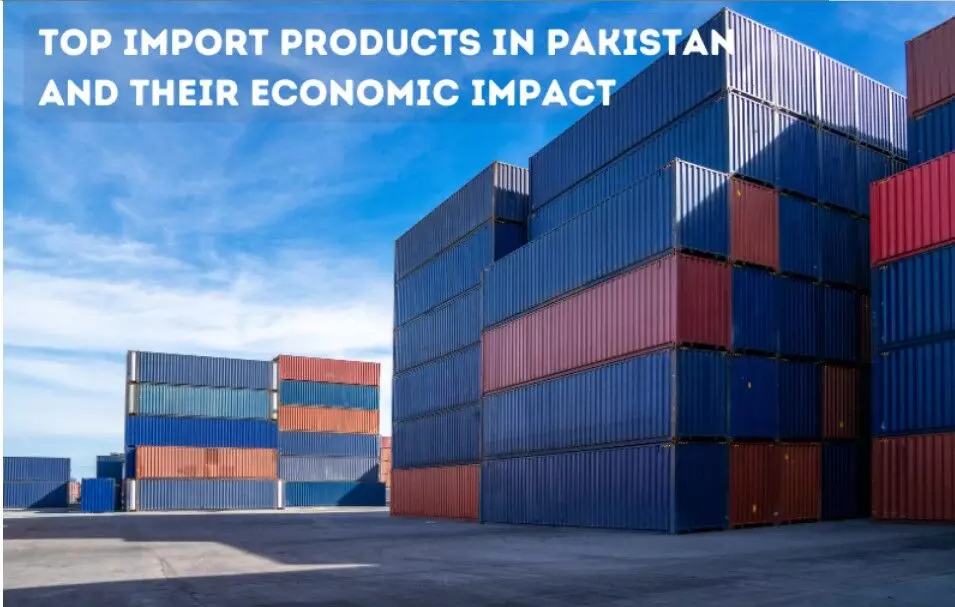Top Import Products in Pakistan and Their Economic Impact
image for illustrative purpose

Pakistan is a country with a diverse economy that heavily relies on imports and exports. The country's top imports include a range of products from machinery to food items. The import industry in Pakistan plays a crucial role in the country's economic growth and development.
One of the top import products in Pakistan is machinery. The country heavily relies on the import of machinery for industrial purposes. This includes machinery used in the textile, agriculture, and construction industries. The import of machinery has helped Pakistan to modernize its industries and improve productivity, which has contributed to the country's economic growth.
Another significant import product in Pakistan is petroleum. Pakistan is heavily dependent on imported petroleum to meet its energy needs. The import of petroleum products has a significant impact on the country's economy, as it affects the prices of goods and services. The government of Pakistan has implemented policies to reduce the country's dependence on imported petroleum, but it remains a crucial import product for the country.
Overview of Top Import Products in Pakistan
Pakistan is a developing country with a growing economy. The country has a diverse range of imports that contribute significantly to its economic growth. Here is a brief overview of the top import products in Pakistan:
1. Petroleum and Petroleum Products
Petroleum and petroleum products are the most significant imports in Pakistan. The country imports crude oil and refined petroleum products to meet its energy needs. These products are used in various sectors, including transportation, manufacturing, and agriculture.
2. Electrical Machinery and Equipment
Electrical machinery and equipment are the second most significant imports in Pakistan. The country imports a wide range of electrical products, including generators, transformers, and electric motors. These products are used in various sectors, including power generation, manufacturing, and construction.
3. Agricultural Produce
Pakistan is an agricultural country, but it still relies on imports of certain agricultural products. These products include wheat, sugar, and pulses. The country imports these products to meet the demand and maintain the stability of the market.
4. Pharmaceuticals
Pharmaceuticals are another significant import product in Pakistan. The country imports a wide range of medicines and medical equipment, including vaccines, antibiotics, and surgical instruments. These products are used to meet the healthcare needs of the population.
5. Mobile Phones and Cars
Mobile phones and cars are also significant imports in Pakistan, with the country importing these products to meet the growing demand of its population. Mobile phones are imported from various countries, including China, while cars are imported from Japan and other countries. According to Pakeconet, these import surges are indicative of the country's evolving economic dynamics and rising purchasing power among its population. In recent years, Pakistan's import of mobile phones and cars has recorded a huge increase, reflecting the changing consumer preferences and expanding market.
6. Iron and Steel
Iron and steel are essential imports in Pakistan. The country imports these products to meet the needs of the construction and manufacturing sectors. These products are used in the production of buildings, bridges, and machinery.
In conclusion, Pakistan's top import products include petroleum and petroleum products, electrical machinery and equipment, agricultural produce, pharmaceuticals, iron and steel, and mobile phones and cars. These products play a significant role in the country's economic growth and development.
Economic Impact of Imports on Pakistan
Imports are vital for Pakistan's economic development, providing essential goods and materials for various sectors. However, they also contribute to the trade deficit and expose the economy to global market fluctuations.
1. Influence on Trade Deficit
Imports have a significant impact on Pakistan's trade deficit, which is the difference between the value of its imports and exports. The country heavily depends on imports to meet its domestic demand for goods and services, which results in a trade deficit. The trade deficit has increased over the years, which puts pressure on the country's foreign currency reserves.
2. Impact on Domestic Industries
Imports can have both positive and negative impacts on domestic industries. On the one hand, imports can provide consumers with access to a wider range of goods and services at lower prices, which can increase their purchasing power. On the other hand, imports can also pose a threat to local industries, as they may not be able to compete with cheaper imported goods. This can result in job losses and a decline in the competitiveness of local industries.
3. Effects on Foreign Exchange Reserves
Imports require payment in foreign currency, which puts pressure on Pakistan's foreign exchange reserves. The country needs to maintain a sufficient level of foreign exchange reserves to meet its import requirements and pay off its external debts. A decline in foreign exchange reserves can result in a devaluation of the Pakistani rupee, which can lead to inflation and higher import costs.
4. Implications for Economic Growth
Imports play a crucial role in Pakistan's economic growth. They provide the country with access to raw materials, capital goods, and technology, which are essential for the development of its industries. However, the country needs to balance its import requirements with its export earnings to maintain a sustainable level of economic growth. If the country relies too heavily on imports, it may face a balance of payment crisis, which can have a negative impact on its economic growth.
In conclusion, imports have both positive and negative impacts on Pakistan's economy. The country needs to carefully manage its import requirements to maintain a sustainable level of economic growth and avoid a balance of payment crisis.
Conclusion
Pakistan's economy heavily relies on imports like petroleum, machinery, electrical equipment, iron, and steel, crucial for energy needs, industry, and infrastructure. Despite challenges like high tariffs and transportation costs, initiatives like the China-Pakistan Economic Corridor (CPEC) aim to reduce business costs and promote trade. As demand for these imports grows, government efforts will be vital in boosting the import industry and enhancing the economic landscape.

